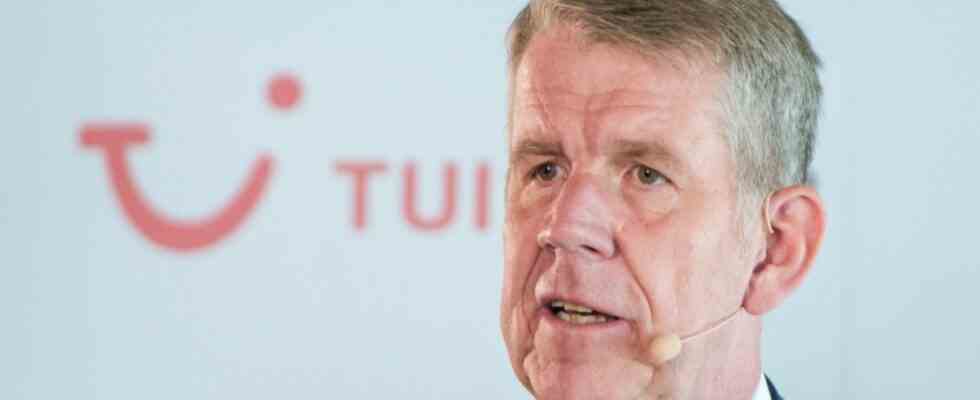If he will be remembered with one sentence, then with this: “We are confident” was heard from Friedrich Joussen again and again over the past two and a half years in this and countless variants: in interviews, at press conferences, at the presentation even scarier Company figures, he was always confident. Now he seems similarly confident that Tui can do without him, because the manager will resign at the end of September, as Tui announced on Friday. A new era is beginning for the travel group from Hanover, which has had more than two and a half turbulent years behind it.
Joussen came to Tui from Vodafone Germany in 2012 to replace Michael Frenzel, who had run the company for almost 20 years. As the new CEO, he wanted to make the travel group leaner and more efficient. Over the years, the qualified software engineer from Duisburg has taken a digitization course, and there has long been an app that travelers can use to book additional offers on vacation. At the same time, Joussen has continued the strategy of operating many hotels, ships and clubs itself.
This is exactly what made things difficult for the company when the biggest challenge in the company’s history came. Because of the corona pandemic, thousands of travelers had to be taken back from their vacation spots from one day to the next and trips that had already been booked had to be reversed. Joussen explained at the Annual General Meeting in February 2021 that “practically overnight” one was a “company without a product and sales”. This presented the travel group with difficulties, above all because a principle is practiced there that is just as problematic in the entire tourism industry as usual: the income that tourists pay for future trips is used to settle current debts with hoteliers and other service providers.
Joussen’s contract includes an attractive release clause
And so Joussen had to go on a massive austerity course during the pandemic. During that time, he cut around 8,000 jobs worldwide, sent thousands of employees on short-time work and sold hotels and other holdings. The Federal Republic saved Tui from bankruptcy with a total of 4.3 billion euros in state aid. In addition, three capital increases have been carried out since January 2021.
During the crisis, one characteristic of the manager, who liked to be called “Fritz” instead of Friedrich, became clear: a fundamental resilience. “Sleevesless” is a word that is often used in reference to Joussen, alternatively “affable” or “jovial”. He has shown his resilience in every public statement since the beginning of the crisis. Borders were closed worldwide and planes remained on the ground, but Joussen sometimes exuded almost grotesque optimism: in 2020 he conjured up summer business and then the coming year 2021. In 2021 he finally counted on 2022, and in May 2022 he emphasized that inflation would hurt him no worries for this year. It was part of the fact that he sometimes made an effort to collect the respective evidence for his optimism – sometimes it was the British, who were happy to book, who would keep the business going, sometimes countries that were far ahead when it came to vaccinations, other times he took 2019 as the reference year, one that has not been one of the best in the company’s history.
Optimism, of course an important tool for managers in general, may have been part of a larger strategy – and increasingly also of a personal exit plan. Actually, Joussen’s contract would have lasted until 2025. As can be seen from the current annual report, however, he had agreed on an exit clause, according to which he can unilaterally resign from his position with three months’ notice from June 1, 2022 and still be paid for two more years.
Demanding tasks await Joussen’s successor Ebel
Industry observers have assumed that he will choose this option at a time when the group is doing well. That time now seems to have come. Over the past few months, Tui has scaled back various state aids, the group boss has emphasized to an even greater extent than before how excellent the prospects are and how the pandemic has led to Tui having undergone a “transformation” into a digital group.
The company, as one analyst put it, is “out of the woods, but not on a bed of roses.” Summer is coming, people are still booking trips: “One thing is clear, demand is high and will last through the summer,” Joussen announced in May. However, if trips are canceled again in the coming months due to the number of corona infections or one of the other crises has consequences for the tourism industry, this will only be reflected in the figures when Joussen is no longer responsible.
His successor is the current CFO Sebastian Ebel, he has big tasks ahead of him. Ebel is an old Joussen confidante from his days at Vodafone, but was also at Tui before that. Industry insiders and former colleagues keep referring to the new boss as a “tough dog”. He is considered “little squeamish”. That will also be necessary: Tui’s share price is less than two euros, which is less than half of what they were worth when Joussen started.

